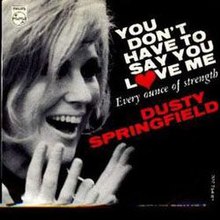You Don't Have to Say You Love Me
| "You Don't Have to Say You Love Me" | |||||||||||
|---|---|---|---|---|---|---|---|---|---|---|---|
 |
|||||||||||
| Single by Dusty Springfield | |||||||||||
| B-side |
|
||||||||||
| Released | 25 March 1966 | ||||||||||
| Format | 7" 45rpm | ||||||||||
| Recorded | Philips Studio, Stanhope Place, London | ||||||||||
| Genre | Traditional pop | ||||||||||
| Label | Philips BF 1482 | ||||||||||
| Writer(s) | Vicki Wickham, Simon Napier-Bell,Pino Donaggio, Vito Pallavicini | ||||||||||
| Producer(s) | Johnny Franz | ||||||||||
| Dusty Springfield UK singles chronology | |||||||||||
|
|||||||||||
|
|||||||||||
"You Don't Have to Say You Love Me" (originally a 1965 Italian song by Pino Donaggio and lyricist Vito Pallavicini: '"Io che non vivo (senza te)") is a 1966 hit recorded by English singer Dusty Springfield that proved to be her most successful hit single, reaching No.1 UK and No.4 US: the song subsequently charted in the UK via remakes by Elvis Presley (No.9/1971), Guys 'n' Dolls (No.5/1976) and Denise Welch (No.23/1995), with Presley's version also reaching No.11 US in 1970. "You Don't Have to Say You Love Me" was also a Top Ten hit in Ireland for Red Hurley (No.5/1978), in Italy for Wall Street Crash (No.6/1983), and - as "En koskaan" - in Finland for Kristina Hautala (No.6/1966).
"Io che non vivo (senza te)" — "I, who can't live (without you)" — was introduced at the 15th edition of the Sanremo Festival by Pino Donaggio — who had co-written the song with Vito Pallavicini — and his team partner Jody Miller: the song got to the final at Sanremo and as recorded by Donaggio reached No. 1 in Italy in March 1965. "Io che non vivo (senza te)" would also be prominently featured on the soundtrack of the Luchino Visconti film Vaghe stelle dell'Orsa (aka Sandra), starring Claudia Cardinale, which was awarded the Golden Lion at the Venice Film Festival that September.
Dusty Springfield, who participated at the 1965 Sanremo Festival, was in the audience when Donaggio and Miller performed "Io che non vivo (senza te)" and despite having no awareness of the lyrics' meaning the song moved Springfield to tears. Springfield obtained an acetate recording of Donaggio's song, but allowed a year to go by before actively pursuing the idea of recording an English version.
...
Wikipedia
